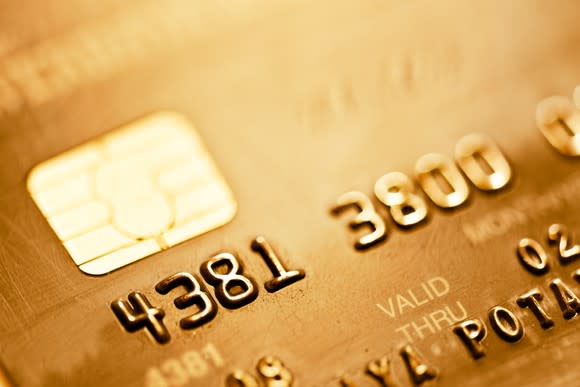Better Buy: Visa Inc. vs. PayPal
One of the hottest sectors in the stock market the past few years has been the payments industry, as credit card networks, payment platforms, and payment processing companies have outpaced the market. This group is exemplified by companies such as Visa Inc (NYSE: V) and PayPal Holdings Inc (NASDAQ: PYPL), whose shares have gained 42% and 64%, respectively, over the past 12 months. But while both have outperformed the S&P 500 index, which makes for a better investment now?
The case for Visa
Many consumers are at least fleetingly familiar with Visa, as the company has about 3.25 billion cards in circulation that were used to make 43.2 billion transactions in the company's 2018 second quarter.
What some might be surprised to learn, however, is that Visa does not directly lend money to consumers; rather, it makes money by acting as the payment network -- think of it as a highway your money travels on -- between merchants, consumers, and their banks. A huge advantage to this business model is that, unlike credit card peers American Express Company and Discover Financial Services, Visa is not directly exposed to credit risk. So, when consumers default on credit card loans, Visa is not liable for any of the risk! Of course, the downside is that Visa also does not get to partake in collecting any of the interest on those loans.

Both Visa and PayPal have rewarded investors handsomely the past couple of years. Image source: Getty Images.
By far one of the company's largest undertakings as a public company was its acquisition of Visa Europe, which is still being seamlessly integrated into the larger parent company. In the company's second-quarter conference call, CEO Al Kelly said he expected the technical migration to be completed by the end of 2018, which is important because it will enable Visa to offer its European clients the same services it offers its other clients. For investors, this means Visa will also be able to charge its European customers higher prices.
In Q2, Visa's revenue grew to $5.1 billion, a 13% year-over-year increase, and adjusted earnings per share (EPS) rose to $1.11, a 30% year-over-year increase. As we shall soon see with PayPal, this strong business model and high growth does not come cheap; Visa currently trades at an adjusted P/E ratio of 34.2.
The case for PayPal
PayPal Holdings is an open digital payment platform that allows consumers to move and manage their money with ease through online and mobile portals. While its account holders can use the platform for any number of different reasons, including sending money to friends and family, PayPal makes most of its money when users purchase goods and services through its platform. Although it only keeps a fraction of a percentage of the total cost of these transactions, the sum total it keeps after billions of transactions adds up quickly.
One of the most exciting things for PayPal shareholders is that the company is firmly positioned to benefit from two huge long-term trends: e-commerce and m-commerce, or mobile commerce. While PayPal has always been a major player in e-commerce, it has only recently begun flexing its muscle in mobile payments -- payments that originate from a mobile device -- as mobile technology has taken off. In the company's first quarter, PayPal processed $49 billion in mobile payment volume, a 52% increase year over year. Mobile payments now account for 37% of all payments facilitated through PayPal's platform.
Management credits its mobile payments success to its One Touch feature, which allows users to register a device and then make purchases at an online checkout with just "one touch" of a button. The feature makes it amazingly easy for customers to make online purchases because it eliminates the need for them to enter cumbersome data such as billing addresses, credit card numbers, and other personal information on their small mobile screens. Merchants love it because customers who use the platform have a much higher online sales conversion rate -- defined as customers who finish a transaction once an item has been placed in an online shopping cart -- than customers who don't. A recent comScore study indicated that One Touch users had an 88.7% conversion rate compared to the 55.3% conversion rate of other digital wallet users.
PayPal's success with mobile payments is certainly driving solid results. In Q1, PayPal's revenue increased 24% to $3.69 billion, and its adjusted earnings per share grew 29% to $0.57. This type of strong top- and bottom-line growth doesn't come cheap. Based on its trailing 12-month EPS of $2.04, shares currently trade at a P/E ratio of 41.8.
The final verdict
Based on Visa's superior business model that does not expose it to credit risk, its growing international presence, and its strong top- and bottom-line growth, I expect it to continue generating market-beating returns in the years ahead. That being said, I would choose PayPal over Visa. While both will enjoy success in the war on cash, PayPal seemingly stands to more directly benefit from macro trends like mobile payments.
With PayPal's growing dominance in a rapidly growing mobile trend and its strong recent moves into the payment processing industry, PayPal shares' upward climb might be far from finished.
More From The Motley Fool
Matthew Cochrane owns shares of PayPal Holdings. The Motley Fool owns shares of and recommends PayPal Holdings. The Motley Fool owns shares of Visa. The Motley Fool has a disclosure policy.

 Yahoo Finance
Yahoo Finance 